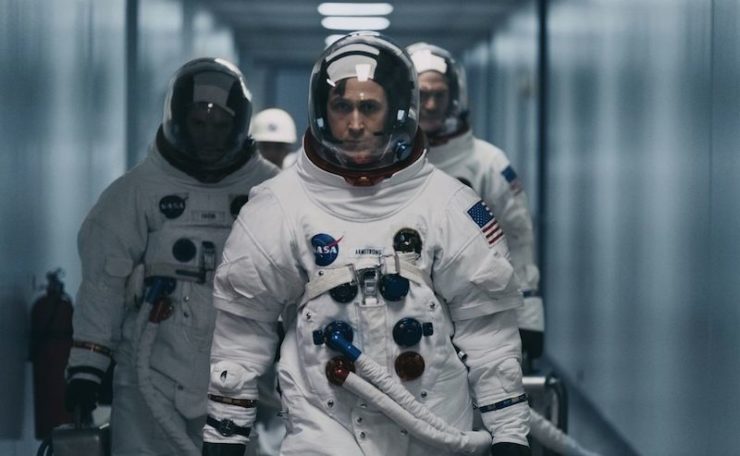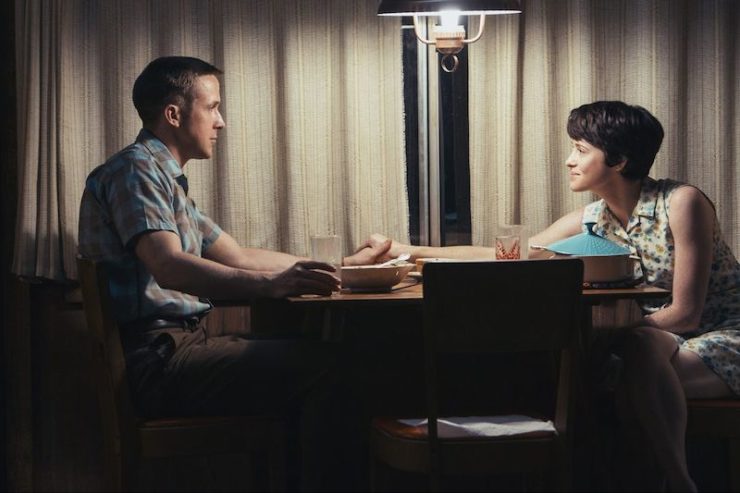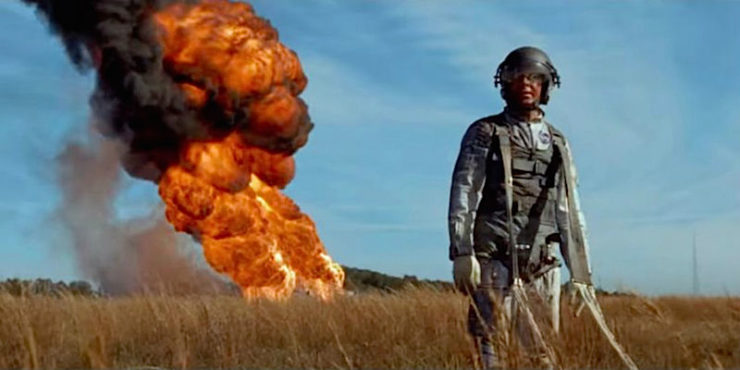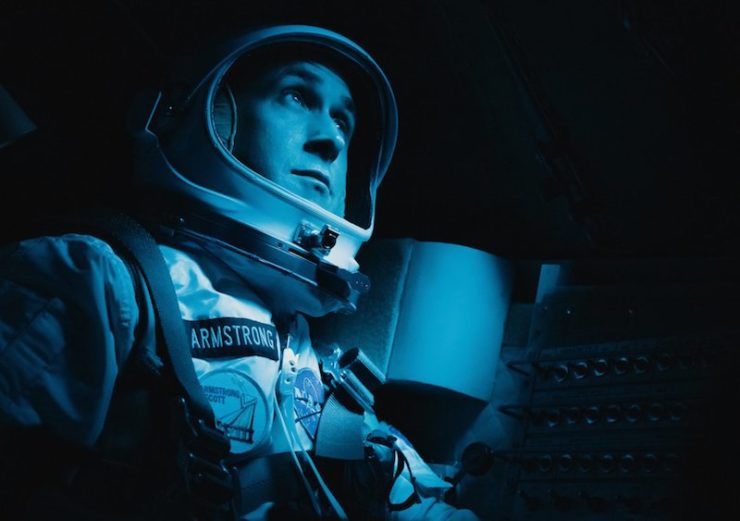I watch space movies not because it is easy but because it is hard. I watch them to remind myself that my country used to do great things, the same way that I read the work of Black authors, Latinx authors, Indigenous authors, Asian-American authors, to remind myself that my country has always been a son of a bitch.
First Man is the rare space exploration movie to honestly confront both of those sides of America. It’s been criticized by some people for not being patriotic enough (because it doesn’t focus on the moment Neil Armstrong planted an American flag on the moon) but it’s actually a complicated work that explores the idea of patriotism and masculinity, and the way those can become entangled. What results is a film that is by far the most interesting, and harrowing, film I’ve ever seen about the U.S. space program.
Like all space movies, First Man has to grapple with its predecessors.
It can be seen as a reply of a kind to The Right Stuff and Apollo 13—where those movies presented the dangers of space exploration, they still retained a certain amount of glossy heroism, where manly men exchanged firm handshakes and dramatic entrances. In First Man, the men of the space program meet casually and hand each other beers at backyard barbecues. The audience catches their names in the course of conversation, as though we’re there in the rooms and yards with them. The astronauts’ wives greet each other with welcome-to-the-neighborhood casseroles, not the portentous conversations about death and duty that are so common in other films. But more than that, director Damien Chazelle and screenwriter Josh Singer show us just how insane this whole project was.

First Man shows us terrified men in rattling, unpredictable rockets. The ignition scenes are each uniquely terrifying—the rockets shake so hard you can’t see anything, it’s impossibly loud, and Chazelle has a diabolical habit of zooming in on the tiny screws that are holding the whole project together to highlight the fact that none of this should work. If you’ve never given real thought, like real, sustained thought to how dark it is in space? First Man will remind you. Repeatedly. It’s just a couple guys and some incredibly thin metal and a couple of dashboard lights, and then endless, endless black.
Like all space exploration movies, First Man is largely about death. We watch Neil Armstrong absorb trauma after trauma—normally the role of the astronaut’s wife, as I’ve explored in a previous essay—and somehow tuck his chin in, allow his eyes to go blank as a shark’s, and just go back to work. The film serves as an indictment of 1960’s masculinity, because it shows the wreckage that that sort of repression leaves in its wake.
The film is also a fascinating reply to Contact, Gravity, and even Interstellar, because what it’s really about is Armstrong’s love and grief for his daughter, who dies as a toddler. Where Ellie Arroway’s and Murphy Cooper’s quests were fueled by a desire to make their fathers proud, and Gravity was largely about Ryan Stone mourning her daughter, here we have a father so wrapped in grief that he pushes his wife away and misses a huge amount of his sons’ childhoods, instead immersing himself in work in order to forget the daughter he lost. There is also a hint that he possibly almost wants to become another space program casualty—it would stop the pain and fear, after all.
Technically the film is a great departure from previous films about space exploration—scenes are short and choppy, conversations are terse, and many of the shots are tight, zooming right up to the faces of Armstrong, Janet Armstrong, Elliot See, Ed White. Sometimes we switch to a blurry handheld. For most of the film we are also very much in Neil Armstrong’s point-of-view, so rather than the glorious moments that The Right Stuff and From the Earth to the Moon dramatized, there are backyard parties at David Scott’s house, or Neil working on engineering problems at the dinner table while his sons chase each other around the house. It makes these giant historic moments almost unbearably personal and human.

It’s also completely realistic about the two things I find most interesting about Neil Armstrong. First, the man crashed everything. Literally he crashed constantly, in test planes, lunar landing vehicles, spacecraft, everything. But the other side of that coin is that he survived those crashes and kept a cool head in a crisis, which made him uniquely qualified to survive multiple trips into space. The film opens with one near-crash, when he’s flying an X-15 and nearly bounces off the atmosphere.
Name a more terrifying sentence than that—I’ll wait.
Later, during the Gemini 8 mission, he and David Scott are assigned to link up with the Agena Target Vehicle to practice orbital docking. Unfortunately the spacecraft goes into a horrible spin, and both astronauts just about black out, until Armstrong manages to jettison the Agena, and, yes, crash the Gemini 8—the key here being that he crashes it carefully, thus saving himself and David Scott, and, almost certainly, the space program itself. It’s an incredibly intricate balance the film has to strike, showing us that he and the other astronauts mess up a lot because they’re trying things that are almost impossible, but also showing just how heroic it is to keep trying.
This is the first space program movie that shows us something other than the usual space program flag-waving—we see civilians questioning the financial costs of the program. There are anti-Vietnam protests and anti-NASA protests, flowing from one to the other to show that they are part of a larger argument about what America should be. Most effectively, Chazelle focuses on people gathered outside of Cape Canaveral with signs listing the astronauts who have already died over the course of the program while Gil Scot-Heron performs “Whitey on the Moon.” Rather than the usual parade of proud and supportive wives, the film gives us Janet Armstrong accusing the men of NASA of being “boys playing with balsa wood” and it shows us the terrible, terrible cost of our hubris. Somehow Chazelle strips away the veneer of Americana that usually enshrouds the space program, and yet he also shows us just how important it is.

Then there’s the moon landing. I don’t want to spoil it for those of you who haven’t seen the film, but Chazelle makes a few decisions that I thought were perfect, and the whole sequence is intensely moving. There is no flag-planting ceremony, instead there is something far more profound. Again, I am not a cryer. (OK, granted, I cried during Gravity, but I blame the whole 3D IMAX YOU ARE THERE!!! experience.) But when Neil Armstrong stepped out onto the moon I wept like an exhausted child, and I loved every second of it.
And then, I left a film that reckons with the costs of the program and walked past homeless people to make my slow way to my apartment. Are there more homeless people because De Blasio isn’t driving them out of sight like previous mayors allegedly did? Or are there more because the bottom is currently dropping out of the economy? Is it irresponsible to send people to the moon, to plan one-way trips to Mars?
What the movie dances around is the true purpose of the space program. It plays its cards close to the vest—but I am much more for flinging the cards in the air and letting them land. What the space program is for is to give us perspective, to remind us that as individuals we are small, we are meat, we are mortal, but that our Earth is none of those things. It’s to remind us that together we can transcend these tiny individual meat packets—we can dream, imagine, solve problems, and touch other worlds.
Leah Schnelbach was pretty sure she never wanted to go to space after Gravity, and hoo boy, was that instinct ever correct! Come bounce off the atmosphere with her on Twitter!










